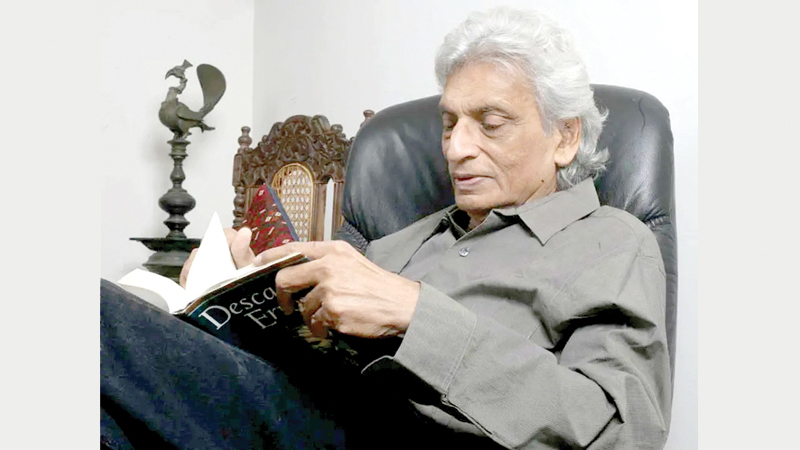The demise of Gananath Obeyesekere (1930-2025) could be interpreted as the symbolic end of the best era of the University of Peradeniya. Gananath embodied the ethos of what Peradeniya stood for throughout his life as a scholar who indulged himself in exploring the unknown.
The strict discipline he acquired from Peradeniya was duly manifested in his scholarly contributions as an anthropologist. Yet, turning to anthropology was serendipitous for Gananath as he first excelled in English Literature during his early years at the University of Peradeniya. Under the colonial settings in which the University of Peradeniya soared its wings, a degree in English literature was regarded to be the creme de la crème.
Audacious move
Having obtained a first class in English with all the coveted prizes, Gananath took to studying anthropology. This was purely an audacious move against the odds in an era when the interdisciplinary shifts were not welcoming in the orthodox setting of the university system on the island. After reaching the heights in the field of anthropology much later, Gananath said that English literature invoked his passion for collecting stories from different cultures, which took him to explore the excellent folk tale traditions in the Sinhala culture in the upcountry.
As a young undergraduate, he freely roamed around the remote villages collecting hundreds of folk tales, stayed among the villagers, and then moved back to the university to produce what he witnessed in a crafty language in the journal he published. This was the quintessential transformative years that Gananath spent in the halcyon days of Peradeniya before stumbling into anthropology. But, I am sure the rich tapestry of life he enjoyed as a wandering youth left a profound impact on him, which carried until the last moment.
For many nationalists in Sri Lanka, Gananath appeared to be an anti-nationalist, who propagated distorted ideas on Sinhala culture and Buddhism. The seminal work he co-authored with Richard Gomrich entitled “Buddhism Transformed” is a fine reflection of his astute intellect which captures how Sinhala Buddhism filled with many rituals and deities, where the Buddha stands in the apex underwent changes in the late 19th Century with the Christian influence.
“Protestant Buddhism” was the term coined by Gananath for the new form of Buddhism that emerged in the epoch of Dharmapala and Olcott. Despite the novelty of this narrative, it lacked substance as neither Gananath nor Gombridge pointed out how Weberian ethics could be applicable in the local Buddhist revival in late 19th Century Ceylon.
One of the uniqueness that Gananath preserved as his own until the very end was his tendency to explore different themes. This was a contrast to the many Western anthropologists like Malinowski or Margaret Mead who hardly went out of their chosen themes. But, Gananath used anthropology as a licence to move within different disciplines ranging from history to religion and even to metaphysics.
The work he published in 2002 “Karma and Rebirth: A Cross Cultural Study unfolded how after-life conception was perceived in completely different cultures. Reaching beyond the parameters of anthropology, he presents a vivid analysis of the Pythagorean conception of rebirth with tribal belief in rebirth among indigenous societies in Africa and North America debunking the popular notion that India was the origin and locus of ideas of rebirth.
He spent more time exploring the rich history of Sri Lanka after his retirement from Princeton University as a Professor of Anthropology. Some of the most appealing works relevant to the complex history of this island were authored by him after his return to Sri Lanka, and they mainly addressed various incidents in the Kandyan kingdom with his anthropological touch.
Post-retirement works
Although his post-retirement writings did not reflect the acumen of a trained historian, they were filled with his astute analysis of many ignored facts by historians. In “Many Faces of Kandyan Kingdom” , Gananath describes the efforts of Rajasinghe II to detain the European prisoners and encourage them to marry local women as an anthropological endeavour. In the same text, he uncovers the cultural relations of the Muslims who lived in the Kandyan kingdom during the 17th Century.
In “Doomed King: A Requiem to Sri Vikrama Rajasinghe”, Gananath presents a fascinating account of Sri Vikerma Rajasinghe, the last king of the Kandyan Kingdom, labelled as a villain in the popular psyche. While admitting the cruelty of Sri Vikrema Rajasinghe, Gananath contends that the king’s ruthless decision to kill the family of Ahaleploa was not illegal as it equated with the traditional practices of the Sinhalese monarchs. Also, he questions the unbiasedness of the account of John Davy and dismisses John Doyle as a champion in espionage, whose Machiavellian tactics intensified the fall of the Kandyan kingdom.
I am sure that Gananath passed away as a fulfilled person having seen the earth revolve around the sun 95 times and in between he pursued excellence in many fields. But, Anthropology always remained his connecting point to the world. Like many of his contemporaries at Peradeniya, he made the best choice by leaving the island to become a global citizen.
All the merits that he earned in academia were acquired after he embarked on his career as an academic in North America. It is axiomatic that whatever greatness he accomplished would have been highly unlikely if he had stayed in the local university system in Sri Lanka, which reached a stage of mediocrity after 1956. Gananath Obeyesekere enters the pantheon of Global Sri Lankans such as CG Weeramantry, CF Ameraisnghe and Stanly Tambiah whose grandeur is still revered by the world.
The writer is a lecturer at the Faculty of Law, General Sir John Kotelawala Defence University




